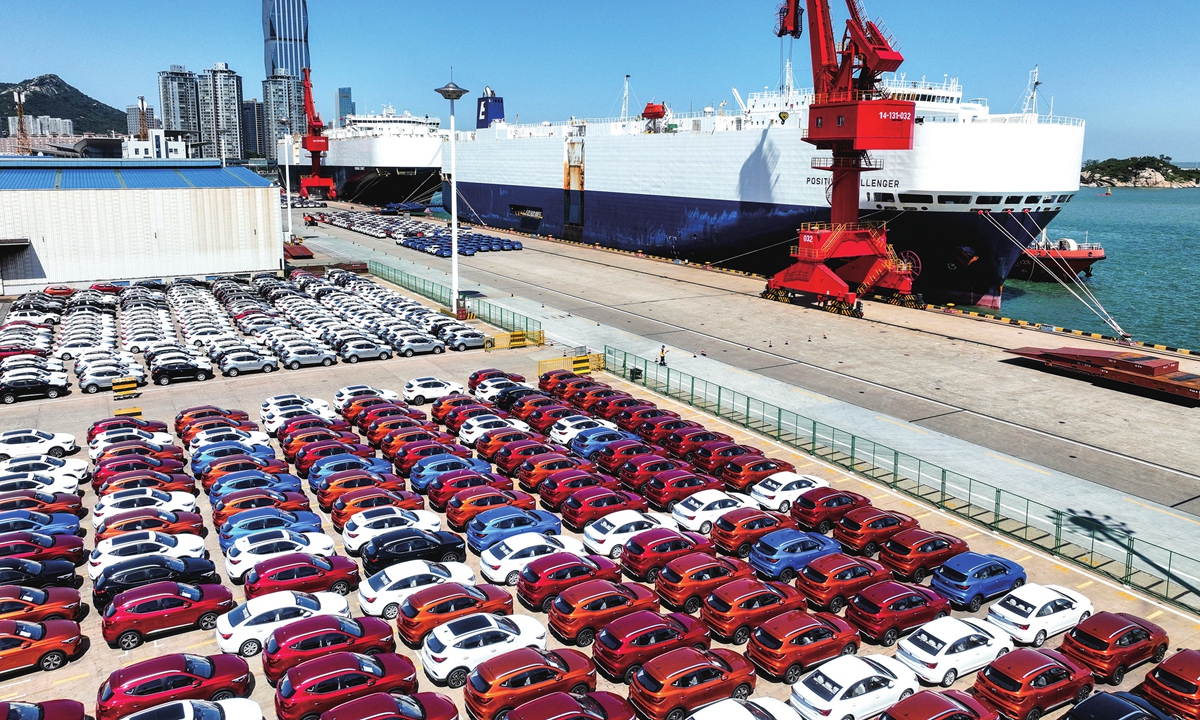
A ro-ro ship docks at a pier in Lianyungang port, East China's Jiangsu Province, to load vehicles headed to overseas markets on August 23, 2023. From January to July this year, the port exported a total of 195,000 vehicles, up 89.1 percent year-on-year. Photo: VCG
More than 90 percent of existing new-energy vehicle (NEV) models will continue to enjoy the purchase tax exemption policy under the new technical requirements released on Monday by Chinese ministries.
The requirements of existing NEV technical indicators are being appropriately raised, from the endurance mileage to the quality of power battery system. The driving range of pure electric passenger cars should not be less than 200 kilometers and the maximum speed of pure electric passenger cars in 30 minutes should not be less than 100 kilometers per hour, according to a statement published by the Ministry of Industry and Information Technology (MIIT) on Monday.
For plug-in hybrid passenger vehicles, the driving range powered by electricity should not be less than 43 kilometers, and the fuel consumption rate is lowered according to weight of the vehicles, read the statement.
From June 1, 2024, models that do not meet the new technical requirements released on Monday will be withdrawn from the tax reduction catalogue, the MIIT said on Monday, while noting that over 90 percent of existing NEV models meet the new technical standards based on the condition of the first half of 2023.
As said in the statement, NEV models that were included in the lists of purchase tax exemption that are still effective before December 31, 2023 will automatically continue to enjoy tax breaks for purchase, but have to hand in relevant certification documents according to the new technical requirements.
NEV models for passenger use that are currently exempted from vehicle purchase tax included Mercedes-Maybach EQS 680, Hongqi EH7, BMW i3, AION Y, Chery Sterra ET, XPeng P5 and Tesla Model Y, according to a list released on November 20 by the MIIT. This is the 71th batch of NEV models that can enjoy the purchase tax exemption policy released so far.
In previous lists released, BYD Yuan Pro, Neta Aya of Hozon Auto, Zeekr 001 FR and other NEV models were included, according to statements published on the website of MIIT.
New-energy buses, trucks and NEVs for special use, such as garbage trucks, vacuum trucks, refrigerated trucks and concrete mixing trucks, were also included in the lists.
The first batch of NEV models enjoying tax breaks for purchase was released in August 2014, according to a notice jointly released by the MIIT and the State Taxation Administration.
In June, China extended the purchase tax breaks for NEVs until 2027. For NEVs bought in 2024 and 2025, the maximum purchase tax exempted will be no more than 30,000 yuan ($4,179) per passenger vehicle. Tax breaks will be halved from 2026, with a maximum of 15,000 yuan exempted per passenger vehicle.
According to the Ministry of Finance, about 520 billion yuan of NEV purchase tax will be exempted or reduced in total per preliminary estimates.
Before the policy extension, the current exemption of purchase taxes on NEVs was scheduled to expire by the end of 2023.
The extension of the NEV purchase tax preferential policy will further stimulate demand for NEVs, release the consumption potential, and play a greater role in promoting the development of the industry, Zhang Xiang, president of New Energy Vehicle Technology Research Institute, Jiangxi New Energy Technology Vocational College, told the Global Times.
NEV sales saw a rapid growth in 2023. By November, the sales volume of NEVs was 8.304 million units, an increase of 36.7 percent year-on-year, with a market share of 30.8 percent, according to statistics from the China Association of Automobile Manufacturers.
Global Times




